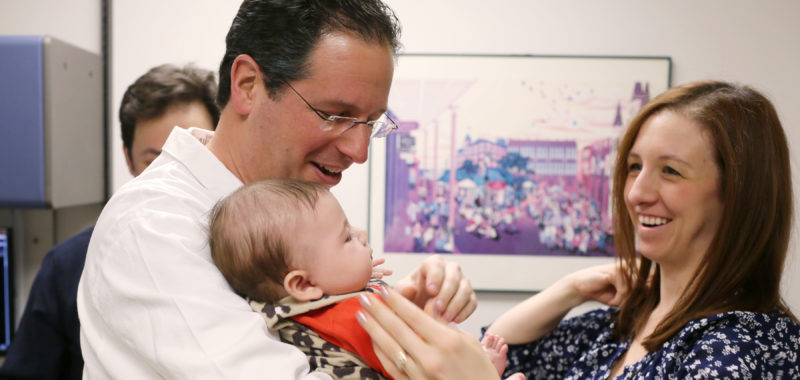What is Hirschsprung Disease?
Hirschsprung disease is a condition in which some of the nerve cells do not form properly in the intestine during fetal development, causing stool to back up and potentially leading to bowel obstruction and a bacterial infection in the digestive tract. All babies born with Hirschsprung disease will need surgery to remove the portion of the intestine that is not working properly.
How is Hirschsprung Disease Diagnosed?
Hirschsprung disease is typically diagnosed within the first 24-48 hours of a newborn’s life, and naturally, parents can be a little overwhelmed upon receiving the diagnosis. It’s not a condition that is spoken about openly and like with many conditions diagnosed around birth, mothers often question if they did something to cause it.
While we don’t know exactly what causes the condition, we do know that mothers have done nothing wrong during pregnancy and that in some cases it may be associated with a genetic mutation.
How is Hirschsprung Disease Treated?
All children with Hirschsprung disease require pull-through surgery to remove the non-functioning section of the intestine and replace it with healthy tissue.
Living With Hirschsprung Disease After Surgery
Surgery to correct Hirschsprung disease is an absolute necessity, but it isn’t a cure-all. The reality is that even after surgery, the majority of children will still have some constipation issues. This is why it is incredibly important to keep in close contact with your colorectal surgeon.
If he or she is aware of any constipation issues after surgery, he or she can recommend a regimen of laxatives and/or stool softeners – called a bowel management program – which can help your child to achieve “normal” bowel function and a good quality of life. We consider “normal” bowel function to be 1-3 bowel movements each day with no accidents. All children with Hirschsprung disease should be able to reach this goal with the proper post-operative management.
In other words, a diagnosis of Hirschsprung disease does not mean that your child will have life-long, life-altering issues, so long as your child is followed closely by a colorectal team familiar with the condition and who partners with families to manage issues as they arise. It is a condition that may change periodically through your child’s life and your child’s regimen may need to be tweaked along the way.
Cincinnati Children’s Colorectal Center
If you don’t feel like your child is where he or she should be, don’t be afraid to ask for a second opinion. We have trained several pediatric surgeons and collaborated with up and coming colorectal centers regarding surgical techniques for Hirschsprung disease as well as bowel management post-surgery. Ask your surgeon where he learned this procedure, how many he has performed it, and post-operative success rates. If you run into any road blocks, our team here is always happy to help consult and/or evaluate your child.
To learn more about how we treat patients with Hirschsprung disease, or to speak with a member of our colorectal care team, call 513-636-2371.
Editor’s note: Lyndsey Jackson, RN, BSN, CPN, and Dr. Jason Frischer hosted a live, online Q&A for parents of infants and children born with Hirschsprung disease on June 10, 2015. Here is a link to a recording of it.






My son is now 13 yrs old. He is very aware of his condition and how important he lets me know if he ever has any problems going to the bathroom. We have been very blessed with the outcome at this point. If I feel there is a problem espically with projectial vommiting I take him to the local ER and request an xray due to his condition and fear of obstruction they never say no. We make sure he has alot of vegtables in his diet and fiber. We have had no issues for at least 6 years. Is there any info on adults still taking care of this and is there a major risk for his children if he wishes to have any?